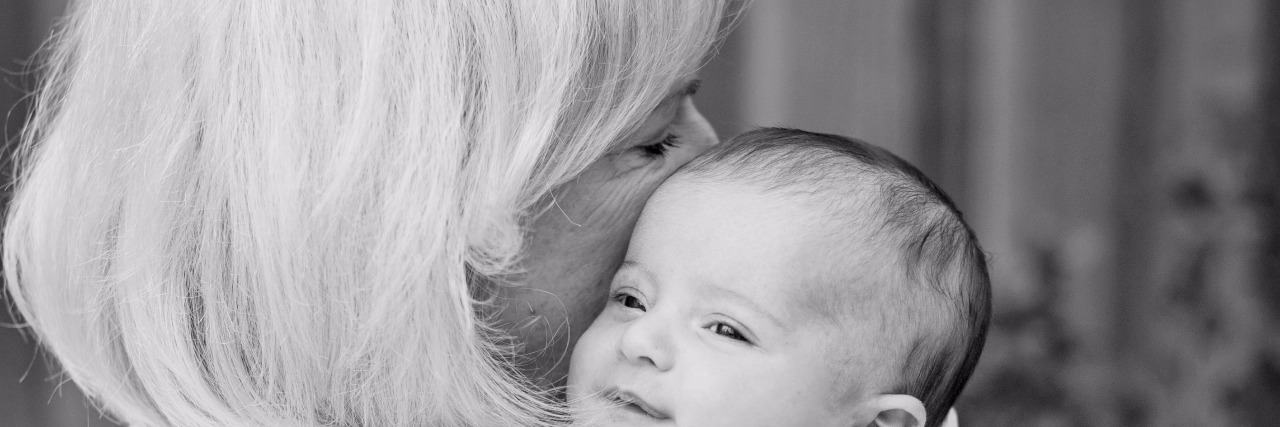Many people don’t know about the wide range of mood disorders that can affect new moms beyond the deep sadness of postpartum depression. I experienced one of the most rare and severe maternal mental health disorders: postpartum psychosis. I became delusional, paranoid and suicidal (view my Tedx talk here for the whole story) a few weeks after having my daughter.
At the time, my mom felt helpless as she witnessed my downward spiral into exhaustion, hopelessness, confusion and then psychosis. Three years later, here’s what I think all grandparents need to know about postpartum depression:
So, your daughter or daughter-in-law just delivered you the biggest bundle of joy on earth and you’re ready to spoil your grandchild and shower them with love and attention — congrats! It might be hard for you to imagine this new mom is feeling anything but the joy and love you’re feeling for your new grand baby.
You might not realize it, but many new mothers feel completely overwhelmed after their babies are born.
For some of these new mothers experiencing postpartum depression, their minds race, they feel guilty they aren’t handling motherhood better, they worry about a range of issues. Is my baby getting enough breast milk? Is it OK to supplement with formula? Is my baby breathing at night? What if I get exhausted and fall asleep and drop my baby? Am I fit to be a mother? Why can’t I lose the baby weight? I can’t seem to appease my colicky baby. Am I a bad mom? They might feel sad and hopeless. In rare cases, these women may even feel indifferent or disconnected from the new little being they just brought into the world.
Here’s what you need to know:
1. It’s more common than you think.
Postpartum depression affects one in seven women who give birth each year. Postpartum Progress, a leading resource on mood disorders related to pregnancy and postpartum, estimates 600,000 women a year in the U.S. get postpartum depression. Lack of sleep, the stress of being a new mom and the hormonal changes after birth can be triggering events that bring about maternal mental health disorders.
2. There are risk factors, but maternal mental health concerns don’t discriminate.
Any new mom can experience postpartum depression, even if they are healthy, even-keeled, successful and have never had any previous mental illness. Some risk factors to be aware of are a history of depression or anxiety in the new mom and/or her family and any recent major stressor such as a house move, job loss, job change, etc. But lesser known risk factors include a perfectionist personality, mothers of multiples, a previous miscarriage, fear of childbirth or a traumatic childbirth experience.
3. It’s not just depression you should watch out for.
Some new moms experience postpartum anxiety and symptoms can include feelings of being overwhelmed, racing thoughts, excessive worry, extreme guilt, difficulty sleeping and/or eating. Other maternal mental mood disorders include postpartum OCD, PTSD and psychosis.
4. It’s completely treatable and often temporary.
Postpartum mood disorders are completely treatable if moms ask for and get the professional help they need. Research has shown women not treated for postpartum depression are less able to bond with their children and care for them properly. Treatment can include therapy and medication and working with a therapist or psychiatrist who specializes in maternal mental health can significantly improve outcomes. See specialists by location here.
5. It doesn’t go away on its own.
Sadly, only 15 percent of new moms get treatment which means way too many moms are struggling in silence. Many new moms fear being being judged and are afraid to ask for help because of the stigma associated with maternal mental illness. If we can get past the stigma and start a dialogue that it’s completely OK to ask for help, mothers and their children will be better off.
6. Family support helps with recovery.
For many new moms, admitting something is wrong and seeking treatment is very challenging, so it’s important she has as much support as possible. Everything from helping her get the right amount of sleep and helping around the house to taking the illness as seriously as a broken bone makes a big impact in her recovery. Just as you wouldn’t expect a mom on crutches with a broken leg to be able to manage everything on her own, you should reach out ask the new mom how she’s doing and how can you help. And then take her lead and help in the ways she needs.
7. It’s not your daughter’s fault and it’s not yours either.
Remember, she didn’t choose to experience this maternal mental health disorder and it’s not something she can just “get over.” You can remind her by being brave and getting professional help, she’s showing what a capable, loving and wonderful mother she is because she is doing what’s best for her and her little one. And I can’t think of a better way to model courage to the next generation than by admitting when we’re in over our heads and then getting the help we need.
If you or a loved one is affected by postpartum depression or other postpartum disorders and need help, you can call Postpartum Support International‘s hotline at 1-800-944-4773.
If you or someone you know needs help, visit our suicide prevention resources page.
If you need support right now, call the National Suicide Prevention Lifeline at 1-800-273-8255 or text “START” to 741-741.
We want to hear your story. Become a Mighty contributor here.
Image via contributor by Claire Mulkey Photography.

